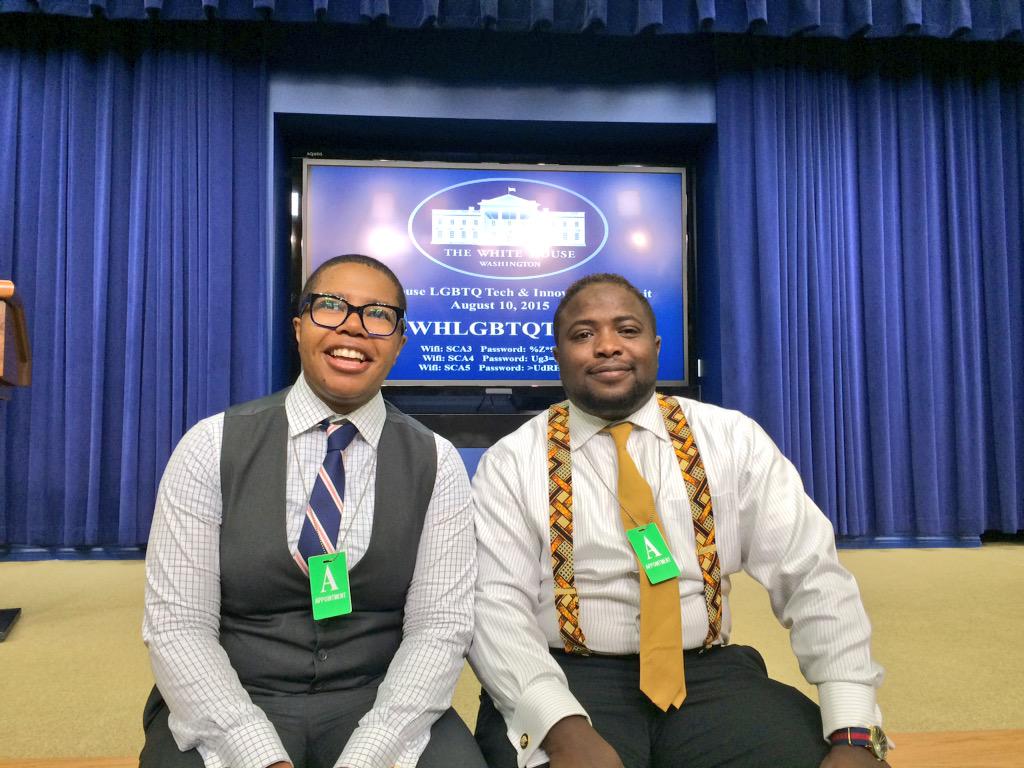Courtney Wilburn used to joke that she was a rainbow-spotted unicorn.
She’s an African-American lesbian in tech. It’s hard to find other people like her in the tech scene. But that wasn’t the case at the White House’s second LGBTQ Tech & Innovation Summit, held earlier this month.
After being nominated by her colleagues at O3 World, Wilburn, 34, was chosen to attend the summit. The event gathered more than 150 lesbian, gay, bisexual, transgender and queer-identifying technologists to hear from U.S. Chief Technology Officer Megan Smith, Presidential Innovation Fellows and federal civic hackers 18F, as well as work on projects around startups, criminal justice and unemployment.
Wilburn, who worked for years in higher education before recently joining O3 World, said the crowd was very racially diverse, with mostly people of color in attendance. She said she seemed to be the only attendee from Philadelphia. Many came from the West Coast, some from as far as London.
Her team is working on a guide to using data for police accountability. It aims to use data to see how communities are being policed and if those strategies are actually working.

The group at the White House’s LGBTQ Tech & Innovation Summit. Courtney Wilburn is far left, front row. (Courtesy photo)
The team hopes to develop an open police API that provides data beyond 911 response times, said Wilburn, who likes developing APIs. They’re looking for data such as: Is this neighborhood regularly patrolled by foot? What are the demographics of people who generally get stopped? Do officers regularly confiscate materials? Do they get returned?
“We want be able to tell stories with this [data],” she said.
###
When the summit began, every technologist was supposed to introduce themselves to the group with an ask and an offer.
Wilburn asked the group to teach a black woman how to code, if they had the opportunity.
Sometimes it's nice to be around people who see things the way that you see things.
Then she said she could help anyone who was interested in learning the Linux command line, an offer that people actually took her up on.
Wilburn, a native of Memphis, Tenn., taught herself how to code — she was coding in Unix workstations in high school, though she did take an introductory computer science class during her undergraduate days at Bryn Mawr College in part because she wanted to take a computer science class with all women (Bryn Mawr is a women’s college). She was also a big fan of her professor, Rebecca Mercuri, with whom she still keeps in touch.
At Bryn Mawr, Wilburn majored in biological and physical anthropology because she wanted to study something she could immerse herself in, instead of something she was already good at.
“I wanted to learn from a clean slate,” she said.

After stints in Baltimore and Washington, D.C., Courtney Wilburn is back in Philly. (Photo via O3 World)
Wilburn interned at the Penn Museum one summer, cataloging skeletons in a database, and she considered becoming a forensic anthropologist. She spent another summer in San Francisco, teaching homeless LGBT youth how to code.
It took her a while to come to terms with the fact that she wanted to be a programmer — because she loved programming so much and was afraid a career would kill her passion.
“I hear about chefs who don’t cook at home and that’s just so sad to me,” she said. “I thought the same thing would happen if I took up tech as a career. I would go home and not want to do anything with a computer.”
Instead, Wilburn found the opposite to be true.
“I feel like I’m more engaged with the tech community,” she said, adding that coming back to Philly’s tech scene after stints in Baltimore and Washington helped. She lives in Fishtown, just around the corner from O3 World, with her wife.
One of the ways that Wilburn has engaged is through the new Philly chapter of Lesbians Who Tech, which she co-organizes. The group is open to everyone, she said, and it’s meant to be a safe space for LGBTQ people to talk about their experiences in the tech sector.
The group’s next meetup is Aug. 27 at Stir Lounge in Center City.
It’s also a way for all the rainbow-spotted unicorns out there to meet each other.
“It’s not that I only want to be around people who are like me,” Wilburn said, “but sometimes it’s nice to be around people who see things the way that you see things.”
Join our growing Slack community
Join 5,000 tech professionals and entrepreneurs in our community Slack today!
Donate to the Journalism Fund
Your support powers our independent journalism. Unlike most business-media outlets, we don’t have a paywall. Instead, we count on your personal and organizational contributions.

National AI safety group and CHIPS for America at risk with latest Trump administration firings

Immigration-focused AI chatbot wins $2,500 from Temple University to go from idea to action

How women can succeed in male-dominated trades like robotics, according to one worker who’s done it


